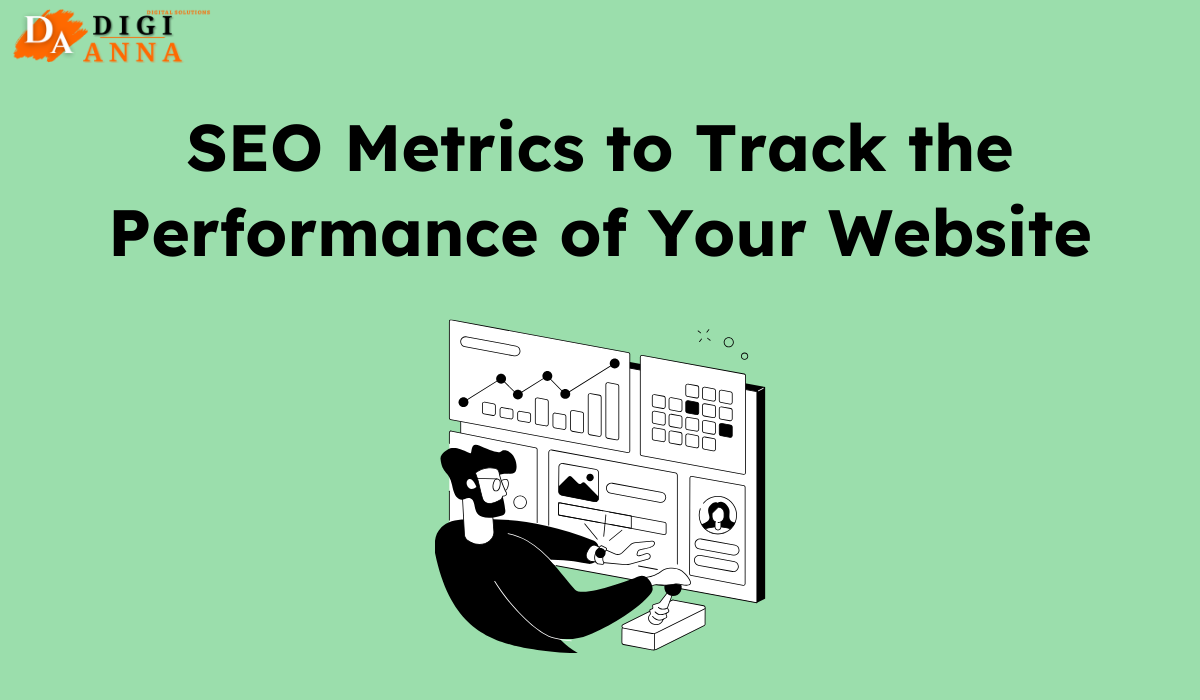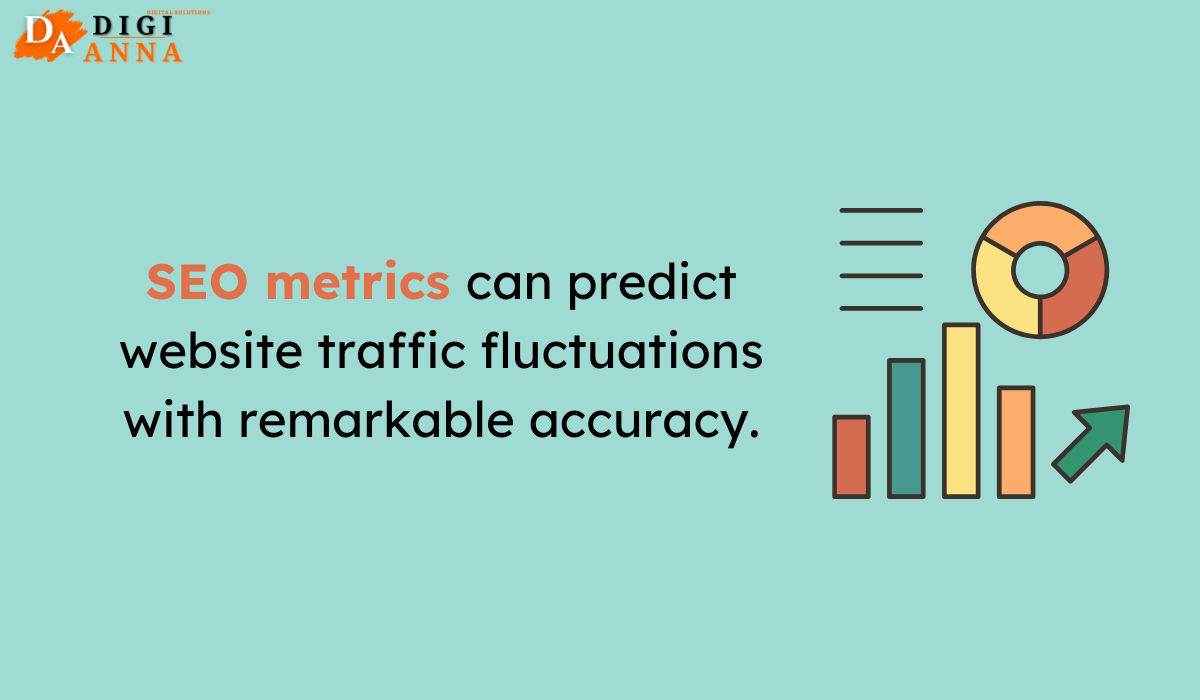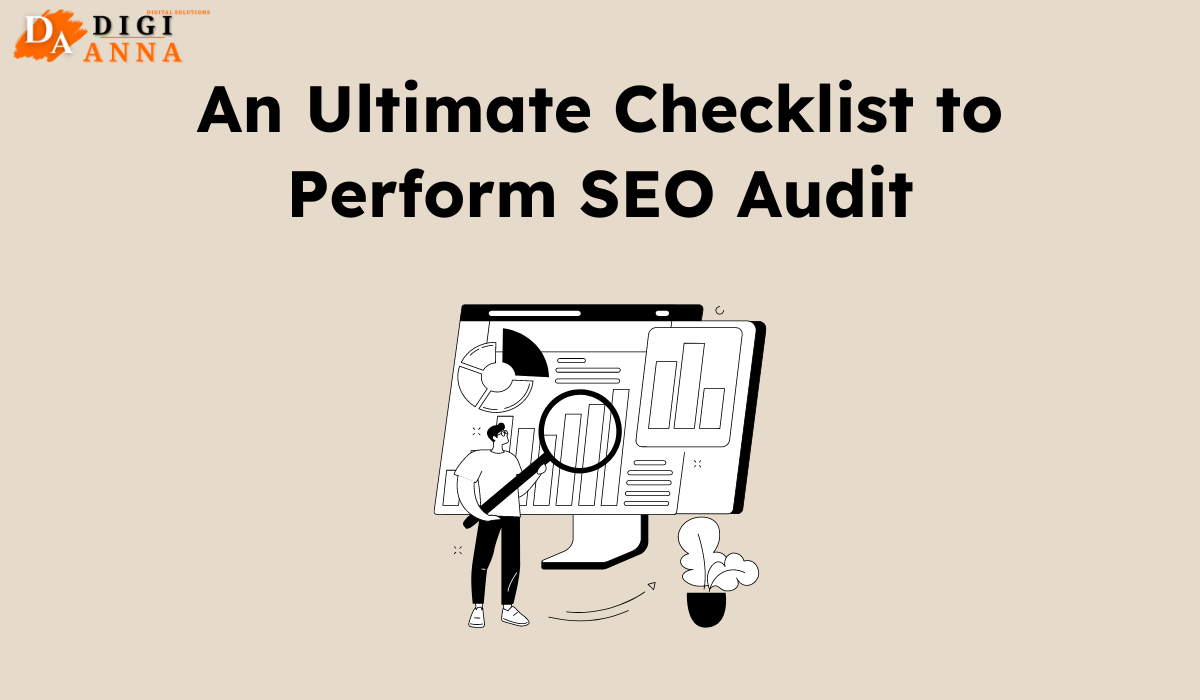Measuring and identifying the situation is the key to improvement in the dynamic world of digital marketing. Search Engine Optimization (SEO) is a cornerstone for achieving online visibility and driving organic traffic to your website. However, simply implementing SEO strategies is not enough; you need to track and analyze specific metrics to measure the effectiveness of your efforts. You must identify the loopholes and prepare for growth by measuring your website performance. This is where SEO metrics step in as the perfect companion to track your SEO performance and prepare the stage for growth.
SEO metrics are a helping hand for SEO experts to get a glimpse into website performance, such as conversions, clicks, traffic, and more. Key to the success of your SEO campaign is its ability to measure and track every aspect of the site. SEO metrics give you the most accurate picture of the effectiveness of your organic search campaign. Moreover, SEO metrics can build better strategies. But which SEO metrics are worth measuring? Let’s discuss the best SEO metrics and which SEO metrics are important to track.
What are SEO Metrics?
SEO Metrics are the most critical part of your SEO efforts, ensuring its effectiveness and allowing you to have complete control over your website performance and ranking. SEO key performance indicators are an ideal way to track your website’s search rankings, visitors visiting your website, impressions your website gets, and space for improvement.
Understanding SEO Metrics
Before delving into the specific metrics, it’s essential to comprehend the different categories of SEO metrics:
On-Page Metrics
These metrics evaluate the performance of individual pages on your website. They include keyword optimization, content quality, and page speed.
Off-Page Metrics
Off-page metrics assess factors outside your website that influence its search engine ranking, such as backlinks, social signals, and brand mentions.
Technical Metrics
Technical metrics focus on the backend aspects of your website, such as site speed, mobile-friendliness, and crawl errors.
User Experience Metrics
These metrics gauge how users interact with your website, including bounce rate, time on page, and conversion rate.
Why are SEO Metrics Important?
SEO metrics play an important role in allowing you to measure your website performance and the actions you can take to improve it. By closely determining your SEO performance metrics, you can take the required measures to raise the website rankings, make your search engine optimization campaign more effective, and drive revenue.
Without the SEO metrics to track at your fingertips, you are just hitting the blind spot, which might not only affect your website ranking but will cause all your SEO efforts to go in vain. It shows the importance of SEO metrics and how they can bring out the best for your website performance and SEO.
Importance of SEO Metrics
- Performance Evaluation: SEO metrics provide valuable insights into how well your website is performing in search engines. By tracking these metrics over time, you can assess the effectiveness of your SEO strategies and identify areas for improvement.
- Competitive Analysis: Monitoring SEO metrics allows you to benchmark your website’s performance against competitors. By analyzing competitors’ metrics, you can identify opportunities to gain a competitive edge and improve your search engine rankings.
- ROI Measurement: SEO metrics help you measure the return on investment (ROI) of your SEO efforts. By tracking metrics such as organic traffic, keyword rankings, and conversion rates, you can determine the impact of your SEO strategies on your business goals.
- Decision Making: SEO metrics provide actionable data that can inform decision-making processes. Whether you’re optimizing website content, refining keyword targeting, or allocating resources to different SEO tactics, tracking metrics allows you to make data-driven decisions that drive results.
Whether you are looking to analyze your SEO performance or find out which website pages are not doing well, SEO metrics can give you detailed insights. So whenever you plan SEO practices, get hold of some of the most important SEO metrics to track and maintain a successful online presence, staying updated with the latest Google Algorithms.
Dominating SEO Metrics to Track Your Website’s Performance
A KPI is not the same as a success metric in SEO. Although Google’s algorithm has more than 150 ranking factors, some are more significant than others.
To optimize your organic search performance, focusing on the SEO metrics to track what matters most is essential. By doing so, your SEO campaign will deliver a better return on investment. So, let’s talk about which SEO metrics are important to track.
1. Organic Traffic
Organic traffic signifies the count of visitors who arrive at your website via unpaid search results.
Why does it matter?
Organic traffic showcases the number of visitors who find your website through search engine results, indicating its relevance and visibility. It reflects the effectiveness of your SEO strategies in attracting potential customers.
How to Track it?
Tracking organic traffic involves utilizing web analytics tools such as Google Analytics. By accessing the Acquisition > All Traffic > Channels report, users can isolate organic traffic and monitor its performance over time. Additionally, setting up custom dashboards and reports can provide deeper insights into specific keywords, landing pages, and conversion rates associated with organic search traffic.
2. Keyword Rankings
Keyword rankings are crucial SEO metrics. They indicate where a website’s pages appear in search engine results for specific keywords.
Why does it matter?
Keyword rankings indicate a website’s visibility and relevance for specific search terms, directly impacting its organic traffic and overall SEO performance.
How to Track it?
- Choose relevant keywords for your website.
- Utilize SEO tools like SEMrush or Ahrefs to monitor keyword positions regularly.
- Analyze trends and fluctuations in rankings to identify areas for improvement.
- Adjust your SEO strategy to optimize keyword performance and enhance your website’s visibility.
3. Pages per Session
Pages per Session, a vital SEO metric, measures the average number of pages a user views during a single session on a website.
Why does it matter?
Pages per Session indicates user engagement by measuring the average number of pages viewed in a single visit. Higher values suggest visitors explore your site thoroughly, signalling relevance and interest.
How to Track it?
Utilize analytics tools like Google Analytics to monitor Pages per Session. Navigate to the Audience section, select Overview, and find this metric alongside other engagement indicators. Regularly analyze trends and optimize content to enhance user experience and increase page visits, ultimately boosting SEO performance.
4. Click-Through Rate (CTR)
CTR measures the percentage of users who click on your website’s link after seeing it in search engine results pages (SERPs). A high CTR indicates that your titles and meta descriptions are compelling and relevant to users’ search queries.
Why does it matter?
It indicates the effectiveness of your online content by tracking the percentage of users who click on a specific link. It helps assess the relevance and attractiveness of your content to users, guiding optimization efforts.
How to Track it?
Monitor CTR through tools like Google Analytics. Analyze which keywords and meta descriptions yield higher CTRs. To find it, divide the number of clicks on a link by the total number of impressions it gets, and then multiply the outcome by 100 to get the percentage. Experiment with compelling titles and descriptions to improve CTR and subsequently boost organic traffic.
5. SERP Visibility
SERP Visibility measures how prominently a website appears in search engine results pages (SERPs), reflecting its visibility to users searching for relevant keywords.
Why does it matter?
SERP Visibility is crucial for assessing a website’s SEO performance, indicating its reach and impact on search engine users. High visibility often correlates with increased organic traffic and better brand recognition.
How to Track it?
To monitor SERP Visibility, utilize SEO tools like Google Search Console or third-party platforms. Track keyword rankings, search impressions, and click-through rates to gauge performance and optimize strategies for improved visibility.
6. Conversion Rate
The conversion rate in SEO indicates the proportion of website visitors who complete a specific action, like buying a product or submitting a form. It reflects the effectiveness of a website in converting visitors into customers. Ultimately, SEO’s goal is to drive traffic to your website and convert visitors into customers or leads.
Why does it matter?
Conversion rate is crucial for assessing the performance of SEO efforts, indicating the quality of traffic driven to a website and highlighting areas for improvement in conversion optimization strategies.
How to Track it?
To track conversion rates, utilize tools like Google Analytics to monitor visitor behaviour, set up conversion goals, and analyze data on conversions to refine SEO strategies effectively.
7. Backlink Profile
Backlink profile refers to the collection of inbound links pointing to a website. It signifies the quality and quantity of links from other websites, impacting search engine ranking.
Why does it matter?
A robust backlink profile enhances website authority and visibility on search engines, driving organic traffic. It also serves as a measure of trustworthiness and relevance in the online ecosystem.
How to Track it?
Tracking backlink profiles involves utilizing SEO tools to monitor the quantity, quality, and diversity of inbound links. Regular analysis aids in strategizing and optimizing link-building efforts for improved SEO performance.
8. Bounce Rate
Bounce rate is the proportion of visitors who leave a website after viewing just one page.
Why does it matter?
Understanding Bounce Rate helps gauge the effectiveness of a website’s landing pages and content engagement. It reflects user satisfaction and relevance, aiding in refining SEO strategies for better user retention and conversion rates.
How to Track it?
Tracking Bounce Rate involves utilizing analytics tools like Google Analytics. By monitoring visitor interactions and page views, one can assess the effectiveness of website design, content quality, and user experience.
9. Mobile Friendliness
Mobile-friendliness refers to a website’s ability to render and function well on mobile devices, ensuring a seamless user experience across various screen sizes.
Why does it matter?
Mobile friendliness is crucial for SEO, as search engines prioritize mobile-friendly websites. This leads to higher search rankings, increased organic traffic, and improved user engagement.
How to Track it?
Track mobile friendliness by utilizing tools like Google’s Mobile-Friendly Test, analyzing mobile traffic data in analytics platforms, and monitoring mobile usability errors in Google Search Console.
10. Page Authority and Domain Authority
Page Authority (PA) and Domain Authority (DA) quantify a webpage’s and domain’s respective relevance and credibility in search engine algorithms.
Why does it matter?
These metrics help assess a site’s potential to rank higher in search engine results, effectively guiding SEO strategies and content optimization efforts.
How to Track it?
Monitor PA and DA through tools like Moz’s Open Site Explorer or other SEO software, analyzing factors like quality backlinks, content relevance, and site usability.
11. Crawl Errors
Crawl errors signify issues encountered by search engine bots while navigating a website. These errors impede proper indexing and can harm search rankings. Whenever a search engine attempts to reach a page on your site but cannot do so, it encounters a crawl error. Deleted pages, no-index pages, and blocked pages in the robots.txt file can cause crawl errors.
Why does it matter?
Identifying crawl errors aids in rectifying website issues promptly, enhancing site accessibility, and improving search engine visibility. It ensures that search engines can efficiently crawl and index website content, optimizing organic traffic potential.
How to Track it?
Utilize tools like Google Search Console to monitor crawl errors regularly. Analyze error reports, diagnose root causes, and implement corrective actions to maintain website health and SEO performance.
12. Core Web Vitals
Core Web Vitals are key performance indicators that assess a website’s user experience, focusing on loading speed, interactivity, and visual stability.
Why does it matter?
Core Web Vitals provide actionable insights for SEO, influencing search engine rankings. They help optimize websites for better user experience, leading to higher engagement and improved conversion rates.
How to Track it?
Monitoring Core Web Vitals involves using tools like Google’s PageSpeed Insights or Lighthouse to assess metrics such as,
- Largest Contentful Paint
- First Input Delay
- Cumulative Layout Shift
Regular tracking and optimization are essential for maintaining a competitive edge in search rankings.
13. Indexed Pages
Indexed pages refer to web pages that search engines have crawled and added to their database. They play a crucial role in determining a website’s visibility and ranking on search engine result pages (SERPs).
Why does it matter?
Tracking indexed pages provides insights into a website’s overall health and SEO performance. More indexed pages generally indicate better crawlability and indexability, improving organic visibility and traffic.
How to Track it?
Monitor indexed pages through search engine console tools like Google Search Console or third-party SEO analytics platforms. Check for indexing issues regularly and optimize site structure and content for better crawlability.
14. Average Session Duration
Average session duration is the mean amount of time that visitors spend on your website within one session. A higher average session duration indicates that visitors engage with your content and explore multiple pages, which can positively impact your SEO performance.
Why does it matter?
It indicates user engagement and content relevance. Longer durations imply more profound interest and potential conversion, which is vital for SEO success.
How to Track it?
Use Google Analytics or similar tools to monitor session durations. Analyze trends, identify engaging content, and optimize pages to enhance user experience and SEO performance.
15. Exit Pages
Exit pages are the last pages that users visit before leaving your site. They signify the final interaction of a user before exiting the site, offering insights into user behaviour and site performance.
Why does it matter?
Exit Pages provide crucial data for optimizing website content and user experience. By identifying which pages have the highest exit rates, SEO professionals can pinpoint areas for improvement and implement strategies to enhance engagement and reduce bounce rates.
How to Track it?
Tracking Exit Pages involves utilizing web analytics tools like Google Analytics. By accessing the Exit Pages report, SEO analysts can identify pages with high exit rates and analyze factors contributing to user exits, facilitating informed decision-making for optimization efforts.
Conclusion
SEO metrics are essential for optimizing your website’s performance and achieving success in the competitive world of online search. You can make informed decisions and continually improve your SEO strategy by tracking the right metrics and understanding their implications. Remember to focus on metrics that align with your goals and ignore those that provide little actionable insight.






